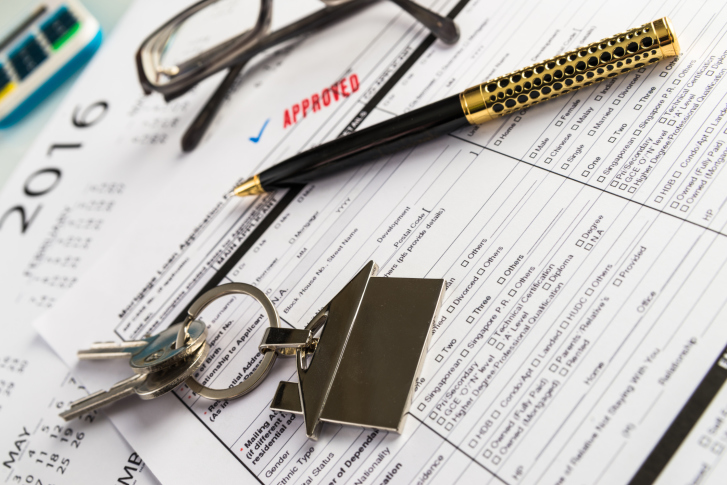 If you want to buy a home in the near future, you are probably aware of just how competitive the housing market is. You need to put yourself in the best position possible to be successful by getting pre-approved for a home loan. This is a very important step, particularly when you compete against people making cash offers. Learn more about the importance of getting pre-approved below, and make sure your offer is taken seriously.
If you want to buy a home in the near future, you are probably aware of just how competitive the housing market is. You need to put yourself in the best position possible to be successful by getting pre-approved for a home loan. This is a very important step, particularly when you compete against people making cash offers. Learn more about the importance of getting pre-approved below, and make sure your offer is taken seriously.
A Pre-Approval Letter Shows You Are Serious
The first reason why you need to get a pre-approval letter is that it will show any potential seller that you are serious about buying the home. One of the reasons why settlers like to accept cash offers is because they know the sale will go through. Without a pre-approval letter, the seller may not know if you will be approved by a reminder for a home loan. By showing a pre-approval letter, the seller will know that you will get financing for the home, and they do not necessarily need to worry about the sale falling apart.
Getting Pre-Approved Gives You A Budget
You also need to get a pre-approval letter because it will give you a budget with which to work. Even though it is fun to take a look at different houses and imagine what your life might look like, you need to know how much money you can spend on a house. The lender will let you know the maximum amount that you are approved for, and you can quickly narrow down your search and find the right home to meet your needs.
Get Pre-Approved Before You Start Your Housing Search
The housing market is constantly changing, so you need to take advantage of every opportunity given to you. If you want to make it easier to navigate a difficult housing market, you need to get pre-approved before you start the housing search. Remember that you do not necessarily need to get a loan from the lender that gave you a pre-approval letter, but the seller needs to know that you have been approved by at least one lender if you want your offer to be taken seriously. A pre-approval letter does exactly that.
 If you are in the process of looking for a new home, you have probably realized that there are lots of options available. It can be very difficult to decide which home is right for you, but there are several important tips you should keep in mind. They include:
If you are in the process of looking for a new home, you have probably realized that there are lots of options available. It can be very difficult to decide which home is right for you, but there are several important tips you should keep in mind. They include: If you plan on retiring in the near future, you might be thinking about moving. The kids might be grown, and you might not want to take care of such a large house. If that is the case, you should consider downsizing. When you downsize your home, you trade in your larger home for a smaller one. What are some of the top reasons why you should do so?
If you plan on retiring in the near future, you might be thinking about moving. The kids might be grown, and you might not want to take care of such a large house. If that is the case, you should consider downsizing. When you downsize your home, you trade in your larger home for a smaller one. What are some of the top reasons why you should do so? If you recently moved into a new neighborhood, you might be looking for a way to meet your neighbors. Ideally, you will become friends with your neighbors. They can take care of your pets when you are out of town and water your plants when you are gone. On the other hand, how can you meet your neighbors without the process being awkward? There are a few great ways to do so.
If you recently moved into a new neighborhood, you might be looking for a way to meet your neighbors. Ideally, you will become friends with your neighbors. They can take care of your pets when you are out of town and water your plants when you are gone. On the other hand, how can you meet your neighbors without the process being awkward? There are a few great ways to do so. If you are applying for a home loan of any kind, there is a high likelihood that your lender will require a home appraisal. An appraisal is done to figure out how much your home is actually worth because the lender does not want to lend you more money than you could theoretically sell the home for in the future. There are some situations where the lender might be fine with a drive/by appraisal. What does this mean?
If you are applying for a home loan of any kind, there is a high likelihood that your lender will require a home appraisal. An appraisal is done to figure out how much your home is actually worth because the lender does not want to lend you more money than you could theoretically sell the home for in the future. There are some situations where the lender might be fine with a drive/by appraisal. What does this mean? If you want to purchase a house, you will probably have to take out a mortgage. There are only a few people who have enough cash to purchase a house outright, so most will go to the bank for a loan. How do you know if the bank is giving you the best possible interest rate? Unfortunately, the bank does not always give you the best interest rate because the bank is looking for a way to make money. If they can get you to accept a higher interest rate, they will make more money on your home loan. What are some of the factors that dictate interest rates on loans, and how can you say money?
If you want to purchase a house, you will probably have to take out a mortgage. There are only a few people who have enough cash to purchase a house outright, so most will go to the bank for a loan. How do you know if the bank is giving you the best possible interest rate? Unfortunately, the bank does not always give you the best interest rate because the bank is looking for a way to make money. If they can get you to accept a higher interest rate, they will make more money on your home loan. What are some of the factors that dictate interest rates on loans, and how can you say money? There are a lot of people who are concerned about cost-of-living increases. If you are looking for a way to save money, reduce your utility expenses. One of the ways to do so is to use a smart thermostat. You can use a smart thermostat to exert greater control over when your HVAC unit is on and when it is not. Your thermostat can even tell your HVAC unit to stop running when you are not home, which can help you save a lot of money on your utility expenses.
There are a lot of people who are concerned about cost-of-living increases. If you are looking for a way to save money, reduce your utility expenses. One of the ways to do so is to use a smart thermostat. You can use a smart thermostat to exert greater control over when your HVAC unit is on and when it is not. Your thermostat can even tell your HVAC unit to stop running when you are not home, which can help you save a lot of money on your utility expenses. Right now, it is difficult for people to purchase a house. Prices are very high, inventory remains at record low levels, and this is contributing to bidding wars. Even though everyone is having a hard time finding a house, Millennials and Gen Z buyers are struggling more than other people. What are some of the biggest hurdles that these buyers need to overcome?
Right now, it is difficult for people to purchase a house. Prices are very high, inventory remains at record low levels, and this is contributing to bidding wars. Even though everyone is having a hard time finding a house, Millennials and Gen Z buyers are struggling more than other people. What are some of the biggest hurdles that these buyers need to overcome?  If you take a drive around your neighborhood, there is a high chance that you will see a bunch of houses for sale. All of a sudden, you feel a bit of curiosity strike you. You might not be looking to move, but you might want to go look at that house anyway. There is nothing wrong with doing so! There are several reasons why you should still go and take a look at houses that are for sale even if you are not looking to move.
If you take a drive around your neighborhood, there is a high chance that you will see a bunch of houses for sale. All of a sudden, you feel a bit of curiosity strike you. You might not be looking to move, but you might want to go look at that house anyway. There is nothing wrong with doing so! There are several reasons why you should still go and take a look at houses that are for sale even if you are not looking to move. Even though many people are focused on some of the most common mistakes that first-time home buyers make, there are also a lot of mistakes that first-time sellers make. Your house is an investment, and the time to capitalize on that investment is when you sell your house. What are some of the mistakes you need to avoid if you want to find the best deal possible?
Even though many people are focused on some of the most common mistakes that first-time home buyers make, there are also a lot of mistakes that first-time sellers make. Your house is an investment, and the time to capitalize on that investment is when you sell your house. What are some of the mistakes you need to avoid if you want to find the best deal possible?